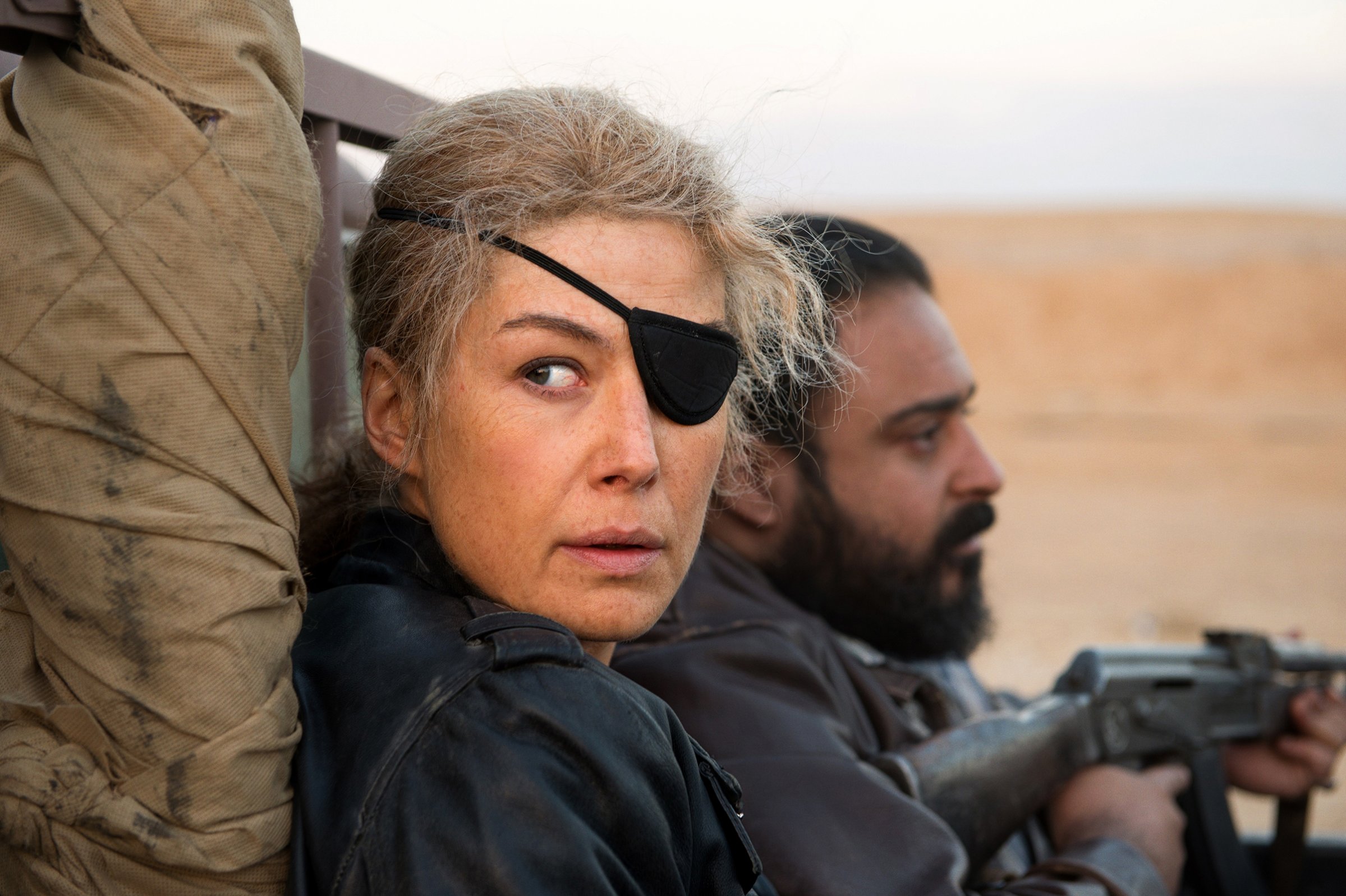
Marie Colvin had a swagger even before she had an eye patch. As a foreign correspondent for Britain’s Sunday Times, she didn’t answer to a daily deadline. She could follow her instincts to the root of a story, or the place it was inevitably headed. More than once, Colvin emerged with a full notebook in hand from the place every other reporter was waiting to get into.
Homs, Syria, was not that kind of place. In February 2012, the besieged city was too dangerous for most seasoned correspondents. It was where she was killed, by a Syrian rocket, at age 56. The law of averages makes no exception for war correspondents, and Colvin was not averse to risk; one of her eyes was lost to shrapnel in an ambush in Sri Lanka. But were her death a statistically random event it would not have produced three books, a documentary and now A Private War, with Rosamund Pike starring as the driven, tortured reporter.
The movie, directed by Matthew Heineman and based on a Vanity Fair profile, opens and closes by drifting dreamily over the pancaked cityscape where Colvin did her final work. After being smuggled into the Bab Amr neighborhood, where 28,000 civilians were dying under the kind of shelling associated with Stalingrad, she filed first to her paper. Then she streamed a series of live TV interviews that placed before the world footage of a 2-year-old boy dying on a tabletop.
That alone would have made Colvin’s own death a billboard for essential journalism. But evidence has emerged that the Syrian government, incensed at seeing its antiseptic version of the siege contradicted by Colvin’s reports, set out to kill her. In a 2016 television interview, Syrian President Bashar Assad said Colvin got what she deserved.
The movie elides this point, preoccupied as it is with why Colvin was there in the first place. The private war of the title is between the Long Island native and her demons, including vodka, posttraumatic stress and whatever emptiness drove her forever into the field. Pike turns out to be better at addressing the question than the sometimes preachy screenplay: the actor nearly inhabits Colvin, working inward from the frizzed hair, cigarettes and La Perla underwear. She finds the layers of wry humor, brittle ambition and visceral restlessness that produced, in turn, strained friendships, accolades and episodes of sloppy drunkenness.
If war reporters feel at home anywhere, it’s in a hotel where the only guests are other war reporters. (Years ago I met Colvin when she stepped in front of me to take the last room in one.) Those days wind down in the camaraderie of a meal shared by a clan that gathers in places normal people are trying to leave.
But there’s also a despondency in being a foreign correspondent, the isolation waiting in the room upstairs, in competition, or in transit as opposed to travel. As Anthony Shadid, the New York Times journalist who died in Syria a few days before Colvin, once wrote: “I was a suitcase and a laptop drifting on a conveyor belt.”
Pike’s Colvin moves in that zone, the crowded emptiness that can be filled at least part of the time by the ideals that informed her career: the work felt essential because, in the world beyond a damaged self, it truly was. Colvin focused relentlessly on the civilians caught in conflict, and A Private War does too. The film caroms from Iraq to Sri Lanka, to Libya to Syria, with flashbacks to the searing horrors that lurk in Colvin’s mind–the things you can’t unsee.
It’s rare for Hollywood to capture the developing world. An exception, like Fernando Meirelles’ The Constant Gardener, marries the lushness of a feature with the vivid authenticity of a documentary to realize something that surpasses both. Heineman has made a lot of docs, which may be why in his feature debut the scenes of deepest emotion–the jagged weeping of Kurdish widows, the Syrian father standing over the body of his child–feel as real as Pike does, playing a woman who gave her life bearing witness.
More Must-Reads from TIME
- Cybersecurity Experts Are Sounding the Alarm on DOGE
- Meet the 2025 Women of the Year
- The Harsh Truth About Disability Inclusion
- Why Do More Young Adults Have Cancer?
- Colman Domingo Leads With Radical Love
- How to Get Better at Doing Things Alone
- Michelle Zauner Stares Down the Darkness
Contact us at letters@time.com